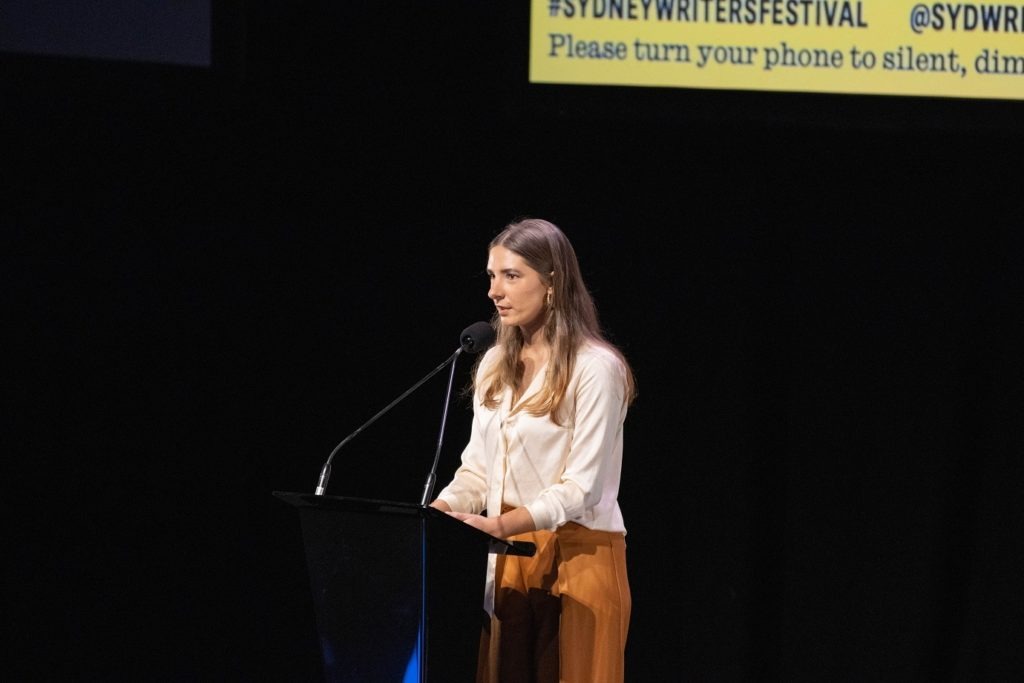Everything I have to say is rooted in the deepest respect and honour for the sovereignty and custodianship of this place. I pay this respect and honour to the Gadigal peoples of Eora and the broader Dharug nation, to the rivers and mountains and sea which surrounds it, to the ancestors and warriors who protect it, to the people whose custodianship and care maintains the culture and spirit of the land.
I spend a lot of time thinking about responsibility. In my family we were raised with a sequence of R words: respect, responsibility, reciprocity. My parents like alliteration, and always sought to raise us with a sense of accountability for our actions and the work we do in this world.
The Jamaican American poet Claudia Rankine writes extensively and at times torturously on poetic possibilities and responsibilities. Her work is deeply troubled by acts of witnessing, of the purpose of poetry in the face of oppression and tragedy. “There is no innovating loss,” she writes, thinking of the many acts of violence and racism she has witnessed against black people in America, and the never-changing phenomenon of public indifference to systemic abuse.
Rankine searches for the space and permission to allow her own body to refuse acclimatisation to grief, referencing the Korean American poet Myung Mi Kim when she writes: “what alerts, alters.”
It’s hard to hope that what alerts will alter in this settler colony. Rankine is right when she says there is no innovating loss. There’s no crime or violence so severe that merely by witness we can command justice. If it could, landmark investigations and reports into systemic racism and abuse of Aboriginal peoples like the Bringing Them Home report and Royal Commission into Aboriginal Deaths in Custody wouldn’t be punctuated by exponential increases in removals and deaths thirty years since their publication.
As a young Aboriginal woman writing about settler-coloniality, I am working in the long shadows of activists and organisers who have spent generations alerting us to injustice and oppression, who have written their refusal to be silenced and have fought for every inch of paper they’re published on, trusting for no reason beyond necessity that their words will reach those most needing their imagining.
In this, poetic responsibility is care, it is enacting agency through narrative projects of refusal and restoration, of honouring the dehumanised and the dehistoricised. Language, and those who work in it must be committed, as Cree poet and scholar Billy Ray Belcourt writes, to “lessening the trauma of description.” It is work, it is solidarity, and as every old adage on those who write history tells us, it is power. Literature has power, it absolutely does, but for that power to alter we also need time.
I come to my work through immemorial time. Time which was given to me by those who have come before, who have created paths and teachings and ways of being in a world I might not always understand, but which I am always responsible to. It is my work to give that time in turn to those who are coming next: to carry it carefully from the past into futurity, to enrich the soil and plant seeds that will grow for the next gathering.
We are running out of time.
The ecological theorist Timothy Morton describes climate change as a ‘hyperobject’, an event beyond which darkens the horizon behind it, and calls into question all the ways we have of making meaning. For many young people the reality of the horrors we will witness in our coming years is not yet real as it is for the people of the Marshall Islands, Tuvalu, Greenland, India. What is real for us now is the imagining we have lost from our future. The possibility of continuity, of descendants, of forevers.
In losing the assurance of futurity my place in the world has been taken from me. I’m lucky: it wasn’t my life that was strangled from my throat under the knee of the state or bled out on the floor of a cell. It wasn’t my child pulled from my arms and thrust into a cage or into a racist and punitive welfare system. I’ve never had to flee my home for my family’s survival, I wasn’t taken from my parents and my community; the harm done to my land and waters will destroy us all but I’m not drinking poisoned water in crumbling and unliveable government housing because a corporation bought enough votes to drain the very belly of this country.
When Alexis Wright wrote that, “All times are important to us. No time has ended and all worlds are possible”, literary scholars everywhere sighed with relief at the prospect of utopian thinking. But what she also means is all the times and worlds and dreams and nightmares of our immemorial are still there, and that every past, and every future makes a terrible claim on us, even the dead, and even those who cannot be born.
How do young people as the inheritors of both the dreams and the nightmares of our future write into responsibility? If we are not able to be ancestors in this world with learnings and stories to pass on to endless generations of those yet to come, you can be damned sure you’re going to hear us now.
Why do stories matter? Because they must. Because story is the voice of history and the voice of futurity, and the voice of time. We don’t know what our future holds and withholds from possibility, from justice. We do not know what is in reach. But we must, we must write in the hope of radical imagination.


